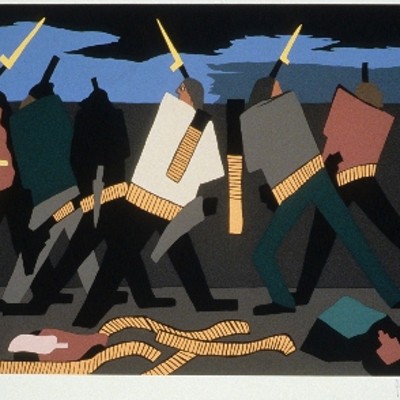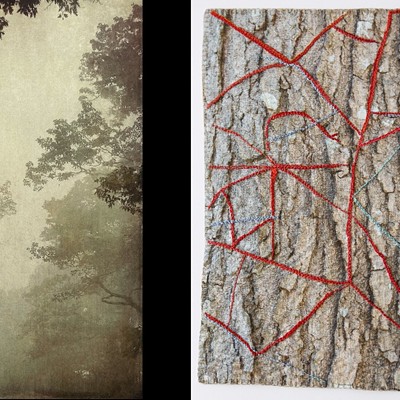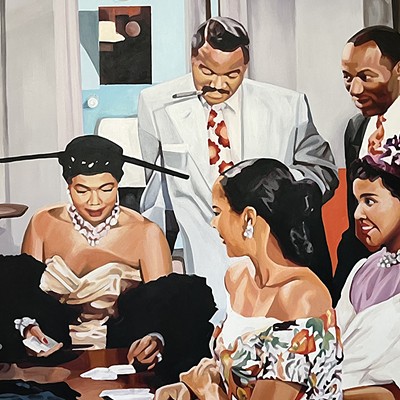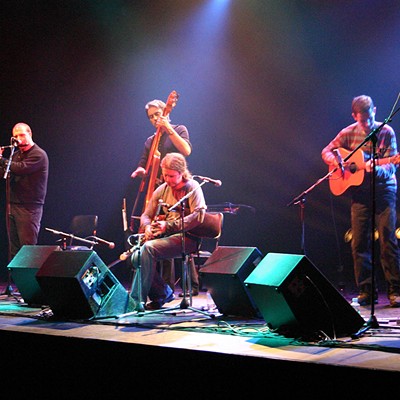Nowadays, the tumbling-down houses are often home to African Americans, and it's among their weedy alleys and vacant lots that Harris first learned to dance. Now 39 years old, he came of age when b-boy dance (better known by what he calls the "misnomer" of break-dancing) was electrifying city kids on both coasts, and he and his friends practiced its syncopated moves on the urban asphalt. Unlike most of those wild, young dancers, Harris, in the years since, made the almost impossible transition from street to theater.
Today, he's an acclaimed choreographer, dancer and artistic director with a string of awards and an eponymous company, Rennie Harris Puremovement, which he brings to Tucson's Centennial Hall this Saturday night for a single performance of his newest work, Facing Mekka.
A self-styled ambassador of hip-hop, he's brought the airborne art form a long way from North Philly's cracked pavements. He's still based in Philadelphia, and his 11-year-old troupe sometimes plays the old neighborhood, but they also regularly crisscross the United States to dance in highfalutin' theaters and university halls. In October, they'll play London and Belfast. Last week, he was so deeply immersed in a hip-hop conference in San Francisco that he was unable to give interviews. But in the spring, he told The New York Times that all along he wanted to bring hip-hop to a new place.
"I started my company because I knew hip-hop deserved a life in theatre, beside clubs, revues and music videos," he told a Times reporter last spring just before he debuted Facing Mekka.
The 90-minute multimedia extravaganza features percussionists performing live to a recorded soundscape, in front of a video backdrop of explosive images of dance and racially tinged violence. His 10 dancers, praised by one critic for their "amazing speed and balance," undertake a hyperactive mix of hip-hop and its roots, with moves influenced by everything from African ceremonial dance to Afro-Caribbean salsa to Brazilian capoeira, the close-to-the ground dances developed by slaves in the Brazilian jungles. But the dancers don't forget their North American street origins; some of them even have side careers as hip-hop dancers for rap bands.
Critics have praised Harris for creating an entirely new genre of dance, with some going so far as to invoke the sacred name of Alvin Ailey, whose genius was to merge vernacular juke dance and gospel music with the lovely abstractions of modern dance. (In 2001, Harris won Chicago's Black Theater Alvin Ailey Award for Black Choreography.) Ailey was Texas-born, but Harris is city-bred, and he's tried to bring the hip-hop street idiom beyond explosive gymnastics into shapely choreography. He also incorporates weighty themes, last time around composing a full-length dance narrative, Rome and Jewels, a hip-hop version of the ballet classic Romeo and Juliet. (That piece played Centennial Hall in 2001.)
In the new work, Harris aims even higher, toward a transcendent spirituality. Lewis Segal of the Los Angeles Times wrote that Facing Mekka more than achieves that goal, calling the piece "a complex, deeply intuitive dance experience that takes the vocabulary of this galvanic African American street form into the realm of the spiritual."
The title of the piece, of course, refers to Muslims' practice of facing the holy city when they pray, though Harris has said that for him "Mekka" means self or dance. The work celebrates dance as a way of transcending the world's injustices and takes its audience on a cross-cultural journey of musical and movement influences. Segal said the new work also leaps over the sometimes problematic gender barriers of hip-hop and gives its five women dancers anchoring parts, helping make Facing Mekka "arguably the greatest tribute to black womanhood since Alvin Ailey's 'Cry' in 1971."











